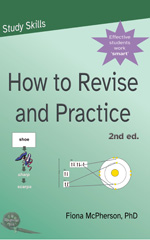- Spacing your learning / practice is more effective than doing it in long concentrated blocks
- People commonly over-estimate how much they've learned, after a concentrated block
- Memorization of items during a study session is most effectively done by recalling items at increasing intervals
Distributed practice more effective than massed practice
It has long been known that spacing practice (reviewing learning or practicing a skill at spaced intervals) is far more effective than massed practice (in one heavy session). An interesting example of this comes from a study that aimed to find the best way of teaching postmen to type (this was at the request of the British Post Office). The researchers put postmen on one of four schedules:
- an intensive schedule of two two-hour daily sessions
- one of two intermediate schedules involving two hours a day, either as one two-hour session, or two one-hour sessions
- a more gradual schedule of one hour a day
The researchers found quite dramatic differences, with the one-hour-a-day group learning as much in 55 hours as the four-hour-a-day group in 80. Moreover, the gradual group showed greater retention of their skills when tested several months later.
Research has also demonstrated that people commonly over-estimate the value of massed practice, and tend not to give due recognition to the value of spacing practice. This particular study confirmed this, by finding that, notwithstanding their superior performance, the gradual group were the least happy with the program - for though they learned much more quickly in terms of hours, it took them many more days (80 hours at four hours a day is 20 days, but 55 hours at one hour a day is 55 days).
Micro-distribution practice
What about practice over much shorter intervals? Say you are learning vocabulary in a foreign language - is it better to repeat a word twice in rapid succession, or to space out the repetitions?
On the basis of the distribution principle, the answer is clear. Go through your list once, then repeat it. That way, every item will be maximally distant from its own repetition. But the distribution principle isn't the only memory principle at work here. The other principle is that of generation - that if you produce the word for yourself, this will strengthen the connection better than having the word given to you. And your likelihood of being able to successfully recall the word is greater if you test it earlier.
So you have two opposing principles at work here: one says maximise the time between repetitions, the other says minimise it. Which wins? Well, neither. They're both at work, so you need to take both into account, like this:
- the first time, test a new word after only a brief interval (your own experience is best here, to tell you what length of interval is best for you)
- on successive recalls, gradually increase the interval (your aim is to find the maximum interval at which you can reliably recall the word)
- if you fail to recall the word, shorten the interval; if you succeed, lengthen it
Distributed practice in skill learning
The distribution principle also applies to skill learning, although people are probably even more reluctant to apply it. Practicing a skill in a concentrated block seems to give better performance, and indeed it does - at the time. The problem is, it doesn't lead to better long-term learning.
Part of the problem is that it makes you over-estimate how well you have learned the skill. But most of that learning will fade quickly. To learn the skill properly (i.e., for over the long term), you are best, not simply to distribute your practice, but also practice the skill in the context of a variety of different tasks. For example, if you were learning to type, you could hammer away at one combination of keys (say, asdf) thirty times, then you could move on to another sequence (jkl;) and repeat that thirty times, and so on. But it would be better if you mixed the sequences up.
It is thought that practicing in this way works better because it requires you to repeatedly retrieve the motor program corresponding to each task. It also requires you to differentiate the skills in terms of their similarities and differences, which may be assumed to result in a better mental conceptualization of those skills.
- Baddeley, Alan. Your memory: A user’s guide. (2nd ed.) London: Penguin Books, 1994.
- Simon, D.A. & Bjork, R.A. 2001. Metacognition in Motor Learning. Journal of Experimental Psychology: Learning, Memory and Cognition, 27 (4).
